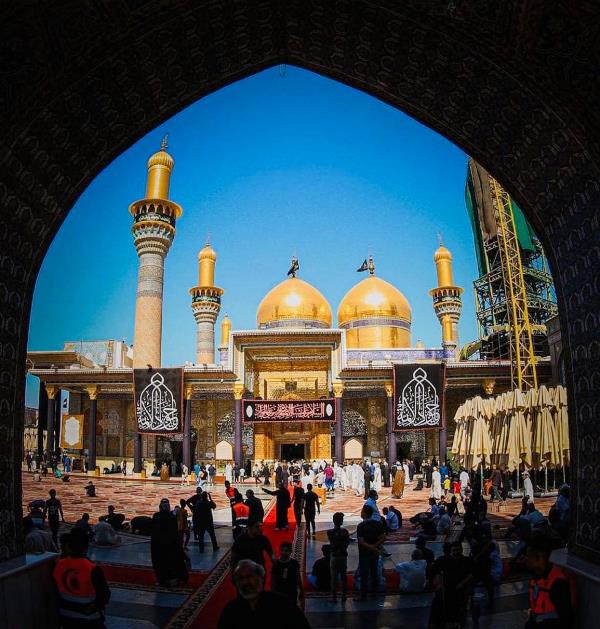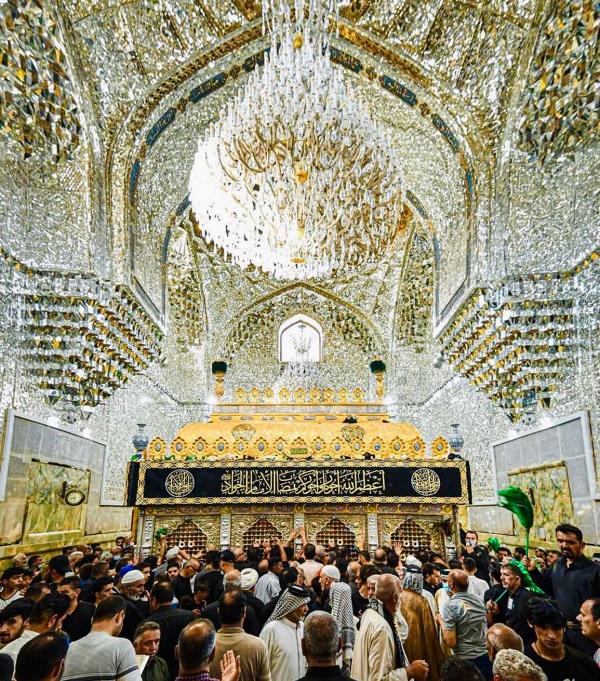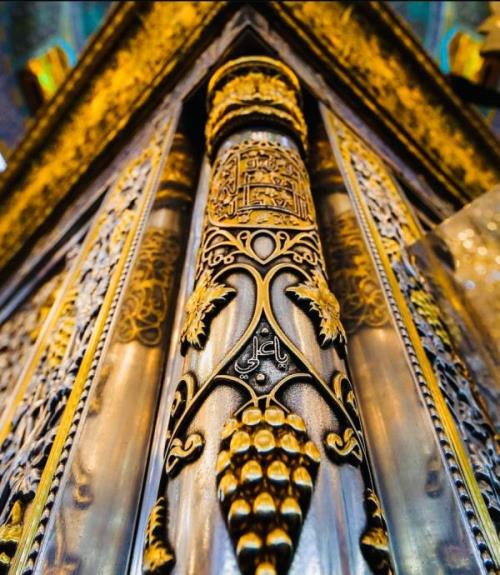Hazrat Ali
The Father of Sufism

Birth
Hazrat Ali (A.S) was born around 600 A.D. in Makka. Ali alayhis" salam was born under unusual circumstances. On the thirteenth of the holy month of "Rajab", Fatima (R.A) the mother of Ali Alayhis" salam, visited the Kaba for performing the pilgrimage. During the course of the pilgrimage while circumabulating the Kaba, Fatima felt the pangs of childbirth. She retired to a secluded place in the precincts of the Holy Kaba, and there Ali (A.S) was born. Ali alayhis" salam hadthus the unique honor of being born in the House of God. This unparalleled honor has endowed Ali with a halo of sancity, which has become the subject of many legends.
Name
Fatima (R.A) wanted to name the child" Asad" after the name of her father. Abu Talib (A.S) wanted to name him Zaid. When the mother and the child came home, the Noble Prophet (S.A.W) and Khadija (R.A) came to see the newborn child. Since his birth, the child had not opened his eyes, and that worried Fatima Rahmatullahi" alayh and Abu Talib (A.S) Rahmatullahi" alayh. As the Noble Prophet (Salla Allahu ta"ala" alayhi wa Sallam). When the Noble Prophet (Salla Allahu ta"ala" alayhi wa Sallam) was asked whether he approved of the child being named as Asad or Zaid, he said that as the child was born in the House of God, he should be named Ali alayhis 'salam, the word Ali being a dervative of Allah. Ali alayhis 'salam had thus the distinction of being named after Allah. No person before him had ever been so named. The name acquired further sanctity as it was proposed by the Noble Prophet (Salla Allahu ta "ala" alayhi wa Sallam).

Standing by the Holy Prophet
When the Noble Prophet (S.A.W) preached Islam publicly & no one listened to him, it was young Ali alayhis 'salam who listened to him & accepted Islam when he was only 10 years old, by saying to the Noble Prophet (S.A.W) that, though he is a child but still he'll stand by him.
Relationship with the Holy Prophet
Hazrat Ali (A.S.) was the paternal cousin of the Noble Prophet (S.A.W) and later married to his youngest daughter Hazrat Fatima alayhis 'salam, from whom he had two sons, Hazrat Hasan alayhis 'salam & Hazrat Hussain alayhis' salam.

Hazrat Ali (A.S.) & Treaty of Hudaybia
It was Hazrat Ali (A.S.) who wrote the treaty of Hudaybia. The Noble Prophet (S.A.W) Salla Allahu ta' ala 'alayhi wa Sallm dictated its terms and Hazrat Ali (A.S.) wrote them down. The Quresh agents objected to the words "Prophet of Allah," being written with the name of the Noble Prophet ((S.A.W)). They wanted instead the words "Muhammad bin Abdullah." The Noble Prophet (S.A.W) agreed to the Change. But Hazrat Ali (A.S.) refused to rub out the words "Prophet of Allah". So then the Noble Prophet (S.A.W) had to rub off these words with his own hand.
Participation in Battles
Hazrat Ali (A.S.) was the hero of many a battles fought in the lifetime of the Prophet (S.A.W). When the exception of Tabuk, he joined all battles and expeditions. In the battle of Badr, Hazrat Ali's alayhis 'salam sword did real wonders. According to arab practice, three of the bravest warriors of the Quresh came out for single combat. Ali alayhis 'salam killed two of them. This struck terror in the heart of the enemy.
The Jews had a chain of strong forts at Khaybar. These were a source of an ever-present threat to the Muslims. The Noble Prophet (S.A.W) led an army to deal with this threat. The Jews put up a stiff fight. But their several forts fell one after another. However, "Qumus" proved to be the strongest Jewish fort. Its commander, Marhab, beat back all attacks. At last the Noble Prophet (S.A.W) saidm "Tomorrow I am going to give the standard to a man who is loved by Allah and His Prophet and who loves Allah and His Prophe. Alla will grant him victory." All were eager to know who the fortunate man would be. The next morning Hazrat Ali (A.S.) was granted the standard. Hazrat Ali (A.S.) defeated Marhab and his brother and took the fort.
Hazrat Ali (A.S.) Strange Battle in Yemen
After the conquest of Makka, the Noble Prophet (S.A.W) thereafter commissioned Hazrat Ali (A.S.) to proceed to Yemen. A force of three hundred soldiers assembled at Quba outside Madina. The Noble Prophet (S.A.W) tied the turban on the head of Hazrat Ali (A.S.) to make his tongue eloquent, to make his talk impressive, and to make his conduct a source of attracation for others. Although Hazrat Ali (A.S.) proceeded to Yemen at the head of a force, he was commanded not to use a force. The force was only meant for defense in the case of any attack. It was a voyage of enlightement. People were to be converted to Islam not by an appeal to arms but by an appeal to their hearts.
On reaching Yemen, Hazrat Ali (A.S.) realized that the people of Yemen were very much under the influence of the Christian priests and Jewish Rabbis, and unless such priests and Rabbis were effectively tackled, there was little likelihood of any success with the common men. The Christian Priests and Jewish Rabbis were proud of their religious knowledge. They challenged Hazrat Ali (A.S.) to a debate. Ali alayhis 'salam was used to fighting duels with his adversaries in the case of battles, now he had to fight an intellectual duel. The first challenge came from a Christian Priest renowned for his learning and piety. A public debate was held. The christian Priest advanced argument in favor of the perfection of Chirstianity, and of Jesus Christ being the son of God. It was observed that in such circumstances there could be no question of another faith. Hazrat Ali (A.S.) samashed these arguments one by one. He quoted from the Chirstian scriptures wherein Jesus Christ had himself spoken of the advent of a Prophet after him. Hazrat Ali (A.S.) took pains to explain that Islam acknowledged Jesus Christ as a Prophet, but did not regard him as a son of God. He maintained that Islam was a perfected form of all previous religions. The debate lasted for several days and at last Ka' ab (The Christian Priest) admitted the superiority of Islam and was converted to Islam.
With his conversion many Christian were also converted to Islam. The Jewish Rabbis felt concerned at the success of Islam. They challenged Hazrat Ali (A.S.) to public debate. This debate lasted for several days, and ended in the victory for Islam. Some of the Jewish Rabbis accepted Islam, and following them many Jews accepted Islam. Thereafter Hazrat Ali (A.S.) spread his men throughout the length and breadth of Yemen to carry the message of Islam to the people. When the people came to know that their Priests and Rabbis had accepted Islam, they lost the will to resist Islam and accepted the new faith willingly. Within a few months most of the people in Yemen were converted to Islam. These people came to look to Hazrat Ali (A.S.) as a great hero.
Hazrat Ali (A.S.) as The Father of Sufism
Hazrat Ali (A.S.) is acclamined as the "Father of Sufism". Almost all Sufi orders claim their descent from Hazrat Ali (A.S.). According to Hazrat Ali Hajveri (Data Ganj Baksh) Radi Allahu anhu, the rank of Hazrat Ali (A.S.) is very high in the line up of Sufism. According to Hazrat Junaid Baghdadi Radi Allahu anhu, Hazrat Ali (A.S.) is the Shaikh as regards the principles and practices of Sufism.
Allah & inward eyes
Once Hazrat Ali (A.S.) was asked whether he had seen Allah. He said that verily he had seen Allah because he could not worship Him without knowing Him. He was asked how he had seen Him, and he said that He had seen him with the inward eyes of the heart.
Gnosis of Allah
According to Hazrat Ali (A.S.)the base of religion is the gnosis of Allah. He said: "The heigh of gnosis is His confirmation. The height of confirmation is Tauhid (oneness of Allah). The height of Tauhid is the acknowledgment of the supermacy of Allah in all matters. He is beyond all attributes. Bo particular of attribute can give an idea of His exact nature. He is not bound by anything; all things are boynd by Him. He existed when there was nothing. He will exist forever. His existence is not subject to the law of birth or death. He is maifest in everything, but He is distinct from everything, He is one. He is not the cause of anything, everything is because of Him. He is unique. He has no partner. He is the creator. He creates as well as destroys. All things are subject to His command. He orders a thing to be and it is. He creates as well as destroys. All things are subject to His command. He orders a thing to be and it is." Hazrat Ali (A.S.) enjoined the severance of the heart from all things save Allah.
Hazrat Ali (A.S.) was asked what was the purest thing that could be acquired, and he said: "It is that which belongs to a heart made rich by Allah". When Hazrat Ali alayhis; 'salm was asked about gnosis, he said: "I know Allah by Allah, and I know that which is not Allah by the Light of Allah."
Prayers to Allah
When Hazrat Ali (A.S.) used to pray, his hair would stand on end. He would tremble and say: "The hour has come to fulfil a trust which the heavens and the earth were uncable to bear." Hazrat Abu Darda Radi Allahu anhu, an eminent companion of the Holy Prophet, said: "None in this world has excelled Ali alayhis 'salam in prayer." While praying, so great was the intensity of the emotions of Hazrat Ali (A.S.) that he would fall into a swoon. It is related that on one occasion, Hazrat Abu Darb=da Radi Allahu anhu found Hazrat Ali (A.S.) lying rigid on the prayer mat, and touching his cold body thought that Hazrat Ali (A.S.) had breathed his last. Then he broke this news to Hazrat Fatima alayhis 'salam. She said that Ali alayhis 'salam often became unconscious while praying. Hazrat Abu Darda Radi Allahu anhu weeping profusely sprinkled some water on the face of Ali, and he said: "Why are you crying? You shed tears when you see me in this state. Imagine what will happen to me when the angels drag me into the presence of God, and I am forced to render an account of my deeds. They will bind me with fetters of iron, and present me before God and those of my friends who will happen to be witnesses will be powerless to help me. They will lament my unhappy plight, but none save God will be able to help me on that day."
Once an arrow stuck in the feet of Hazrat Ali (A.S.). It could not be taken out because of the intensity of the pain felt. When Ali alayhis 'salam stood up in prayers, he was so much absorbed in the devotional excercise that the surgeon pulled out the arrow without Hazrat Ali (A.S.) feeling any pain.
The learning of Hazrat Ali (A.S.)
Ali alayhis 'salam was the most learned man of the age. He was a living encyclopaedia of knowledge. The Noble Prophet (S.A.W) said: "If I am the City of Knowledge; verily Ali is the Gate of it". He was the first person to have learnt the Holy Quran by heart. He possessed a prodigious memory. He was a keen observer l he was a deep thinker; he had an enlightened mind and he carried in his brain a vast storage of knowledge. He was a master of philosophy and rhetoric. He was a great preacher and teacher. His knowledge extended to such disciplines as : logic, mathematics, physics, astronomy, numerology, medicine and history.
Once he said: "You have to guard your wealth, but knowledge guards you. Therefore, knowledge is better than wealth." He also said: "Knowledge cannot be stolen, while wealth is constantly exposed to the danger of being stolen. Accordingly knowledge is better than wealth."
Hazrat Ali (A.S.) a great Mathematician
Once, two persons sat together somewhere to have meal. One of them had three breads & the other one had five. When they were about to start, another person came to them, he was a traveler & didn't have anything to eat. So he asked both of them to let him share the meal with them. They both agreed, so together all three of them ate eight breads. After finishing, the traveler gave them eight Dirhams, and went. They both started to discuss how to share those eight Dirhams. The person who had five breads, wanted five Dirhams, and the person who had three breads was insisting on half from them. Finally they agreed to go to Gazrat Ali alayhis 'salam, and whatever decision he would make, they will accept it. After listening their story, Hazrat Ali (A.S.) told the person who had three breads, that he should take three Dirhams otherwise he would regret. But he wasn't agreed & asked for justice. So then Hazrat Ali (A.S.) explained:
"Total breads were 8, and the persons who ate, were 3, so 8 couldn't be divided with 3. So we should suppose that every single bread was divided into 3 pieces, so all 8 breads totally had 24 pieces (3 * 8 = 24). So, in that way, every person ate 8 pieces, and as you had 3 breads, so you had 9 pieces in total ( 3 * 3 = 9), from which you ate 8 pieces, so from your breads only one part left, which was eaten by that traveler. And the person who had 5 breads, he had total 15 pieces ( 5 * 3 = 15), from which he ate 8 pieces, and the remaining 7 pieces ate the traveler. So, the justice is that you should have only one Dirham as from your part only one piece of bread went to the traveler, and the other person should take 7 Dirhams, as the traveler ate seven pieces of breads from his part." After listening to that explanation, they both became satisfied.
